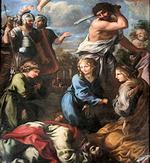Catholic Activity: Developing Our Friends the Senses
DIRECTIONS
Then there are the other kinds of play, the joyful use of the senses. Too often we are blind to the real joy children find in the most commonplace accessories to living. A baby will amuse himself for hours, picking up unsanitary curiosities with the wet end of a finger, putting them in his mouth — old coffee grounds, spilled tobacco, even little slivers of glass if he can find them (and he usually can). He is exploring with his tongue and his sense of taste; and whether or not he enjoys what he tastes, this is one of the ways he plays. He will tear things, like library books and the Sunday paper, and enjoy the sound of tearing. He will bang on the windowpane or the piano and shout with joy at the noise he makes, and this is his primitive version of "praising with clanging cymbals." He will bang on the heads of his brothers and shout with joy at the noise they make. (This is a corrupt form of the praise with clanging cymbals.)
All mothers know that babies do these things, and most of the time we say they are naughty. Not that we're too stupid to think of them as play. We're just too busy to think most of the time. But we can try to remember they are a form of play, and try to appreciate with more reverence the senses God gave our children, through which He communicates to them so many of the joys of living. We can compose games for them to play which will help them develop not only the use of these senses, but also reverence for the variety of ways they can give praise.
One day when there is "nothing to do," we can suggest a tasting game. Tasting five tastes and tasting them again blindfolded. How does salt taste when you can't see it? And sugar, and molasses, in contrast to honey? Do you remember the first time you ever tasted salt? Your Baptism. How mean we were to let Daddy put salt instead of sugar in his coffee last April Fools' Day! King David wrote, "Taste and see that the Lord is sweet." Sugar is sweet, taste it and see. What he meant was that we could grow to love being loved by God just as we grow to love sweet things — but first you have to "taste and see." Another time he wrote, "His judgments are sweeter than honey and the honeycomb." And St. Bernard said, "Jesus is honey in the mouth, music in the ear, a shout of gladness in the heart." John the Baptist ate wild honey, and probably remembered all the things King David wrote. King David, St. John, and St. Bernard had tongues like ours, and not only gave praise with words but with tasting. We can do that too.
And smelling games can be play. Smelling five boxes of spices and smelling them again blindfolded. Jamie claims that ginger smells like soap. Mace is easy to guess because we put it in coffee cake. Clove is sharp and cuts your nose, and anise is strange and different. Cinnamon is easy because of cinnamon toast, and remembering Our Lady on the Feast of the Assumption: "I gave a sweet smell like cinnamon and aromatic balm."
The same game can be played with touching surfaces, and cloth and the leaves of plants, many things. Close your eyes and touch the potato bag. It feels like the Ninivites' sackcloth. How would you like to wear that all through Lent? Feel the softness of the baby's fuzz. Our Lord's silky head felt like that when He was a Baby. And the same game can be played with hearing, sitting in the yard and listening for sounds you would not even notice with your eyes open. A spring night that is all sky and scent and breeze becomes a spring night in terms of sound: frogs, and leaves, and cows cropping grass, dogs barking in different voices, people talking far away. Isn't it strange? When we listen with eyes open we hear so many annoying sounds, like crunching toast, and snuffling, and babies crying, and radiators knocking. The whole universe praises God with its sounds, yet so many times we grumble that there is nothing to praise about. But we can make hearing a praise. We can be still and listen, and learn to praise simply, the way creation gives praise.
How strange we are. We all want "a richer life" for our children. We want to "give them the best." But they have more than we could ever give them when they come from the hand of God. They possess Him when they receive Baptism. Can we give them more than that? They have bodies that can learn to skip rope and swim and turn somersaults, and hands that can learn to shoot marbles and throw jacks and dress dolls. They have minds that can learn to contrive riddles and count scores and make jokes, and feet that can learn to play hopscotch and kick balls and skate. We do not have to teach children they must play, only to help them learn how to play, and the very least of it is the "nice toys" we think we must buy them. They will play, no matter what, because it is part of their longing for Heaven. It is instinctive in them to seek joy.
"Joy is the echo of God's life in us." Let us teach our children how to play, and help them to play. Then with its joy they can praise. And one day they will realize that their joy is the echo of the Lord's joy.
Activity Source: We and Our Children by Mary Reed Newland, Image Books, 1961






